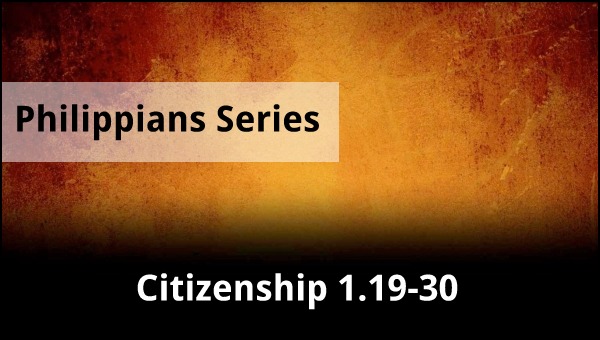By Tyson Thorne

Yes, and I will continue to rejoice, 1:19 for I know that this will turn out for my deliverance through your prayers and the help of the Spirit of Jesus Christ. 1:20 My confident hope is that I will in no way be ashamed but that with complete boldness, even now as always, Christ will be exalted in my body, whether I live or die. 1:21 For to me, living is Christ and dying is gain. 1:22 Now if I am to go on living in the body, this will mean productive work for me, yet I don’t know which I prefer: 1:23 I feel torn between the two, because I have a desire to depart and be with Christ, which is better by far, 1:24 but it is more vital for your sake that I remain in the body. 1:25 And since I am sure of this, I know that I will remain and continue with all of you for the sake of your progress and joy in the faith, 1:26 so that what you can be proud of may increase because of me in Christ Jesus, when I come back to you.
1:27 Only conduct yourselves in a manner worthy of the gospel of Christ so that – whether I come and see you or whether I remain absent – I should hear that you are standing firm in one spirit, with one mind, by contending side by side for the faith of the gospel, 1:28 and by not being intimidated in any way by your opponents. This is a sign of their destruction, but of your salvation – a sign which is from God. 1:29 For it has been granted to you not only to believe in Christ but also to suffer for him, 1:30 since you are encountering the same conflict that you saw me face and now hear that I am facing.
The Benefits of Citizenship, 1.19-30
Paul steers the topic toward his imprisonment, something from which he is certain he will be “delivered”. Unlike most inmates, Paul didn’t view jail as representing a conflict between himself and the Roman government, or of a fight with the law. Rather, Paul understood it to be a spiritual battle. He was sidelined by Satan because his missionary journeys had been too successful. But this was a battle the devil could not win, for God was fighting for Paul. As evidence of this, Paul’s mission carried on even when he couldn’t go anywhere! The gospel was reaching out to the Praetorian guard, and to everyone else who was part of “the system”.
With God as his defender, why would he not be released? Unless it was his time to be called home Paul would plan on returning to people of Philippi; and if God did call him home, that was fine too. For while Paul loved the people so much he would forgo the joy of heaven, he still longed to be with his savior. Still, in verses 24 and 25 Paul makes an interesting admission. Though most of his life’s work as a Christ-follower has been as an evangelist, this was not his only mission. Paul earnestly believed that his calling involved helping God’s people “progress” in their faith and to bring them joy that comes from faith in Christ. This is an interesting perspective. We cannot assume this is a part of every ministers’ mission, but it might be a part of more ministers’ callings than we think. How would it change the style of your pastor’s sermons if he saw himself as a cheerleader for every member of the congregation?
We live joyfully, then, in Jesus. As we mentioned in the introduction, Philippi was an important Roman town. It was modeled after the city of Rome, and its citizens enjoyed all the rights of those who lived in the empire’s capitol. For this reason Paul uses a Greek term that isn’t apparent in most translations. Verse 27 begins with “as citizens”. As proud as the people were of their citizenship in the city, they were even more proud to be citizen’s of God’s kingdom (a theme he will elaborate on in chapter three). This play on words emphasizes the point he is to make about living in a manner worthy of that citizenship. What is someone from God’s kingdom supposed to look like? Paul tells us in the next few verses.
- We are meant to live in unity with each other, as members of an athletic team. This doesn’t mean we won’t ever disagree or argue, only that when it matters most we have each one’s back and we play our position for the success of the whole.
- We are to show empowerment – the kind that comes from faith in God – when facing our enemies. This has two effects: it proves that they are headed for destruction and that God’s people are on the path of salvation.
- We are to suffer for our relationship with Jesus. This is a privilege as well as a struggle. Persecution of any kind is meant to be a good problem to have, to be an encouragement that we are living rightly, not as a fuel for depression or to take a victim’s stance.
The word “rejoice” is abundantly used throughout this letter, and even characterizes this passage. But perhaps a better theme for these verses is “hope”. Our hope in good times and bad, is in Jesus. Our hope when imprisoned is God’s defense of his people. Our hope in conflict and suffering, is in our heavenly citizenship. These hopes will unify Jesus-followers, empower them and allow them to endure until the end. May this be true of us all as we strive to bring the values, the culture and the king of heaven to earth.
|
|
